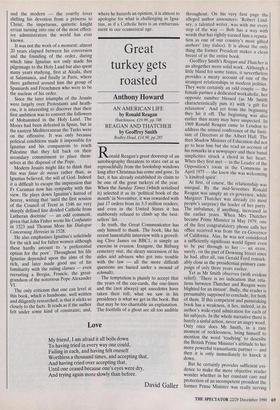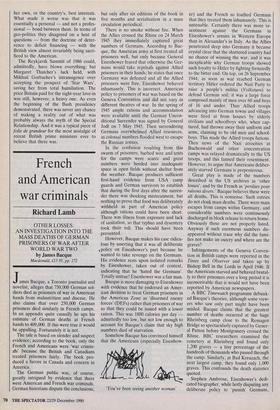Great turkey gets roasted
Anthony Howard
AN AMERICAN LIFE by Ronald Reagan
Hutchinson, £19.99, pp.748
REAGAN AND THATCHER by Geoffrey Smith
Bodley Head, £14.99, pp.285
Ronald Reagan's great doorstop of an autobiography threatens to stare out at us reproachfully from the bookshop windows long after Christmas has come and gone. In fact, it has already established its claim to be one of the great turkeys of the year. When the Sunday Times (which serialised it) selected it as its 'political book of the month' in November, it was rewarded with just 17 orders from its 3.5 million readers; and even in the United States it has stubbornly refused to climb up the best- sellers' list.
In truth, the Great Communicator has only himself to thank. The book, like his recent lamentable interview with a grovell- ing Clive James on BBC1, is simply an exercise in evasion. Irangate, the Bitburg cemetery visit, the sleazy succession of his aides and advisers who got into trouble with the law — all the more difficult questions are buried under a mound of schmaltz.
The temptation is plainly to accept that the years of the cue-cards, the one-liners and the (not always) apt anecdotes have taken their toll; what we saw in his presidency is what we get in the book. But that may be too charitable an explanation. The footfalls of a ghost are all too audible throughout. On his very first page the alleged author announces: 'Robert Lind- sey, a talented writer, was with me every step of the way — Bob has a way with words that has rightly earned him a reputa- tion as one of our country's most gifted authors' (my italics). It is about the only thing the former President makes a clean breast of in the entire book.
Geoffrey Smith's Reagan and Thatcher is an altogether more solid work. Although a little bland for some tastes, it nevertheless provides a meaty account of one of the strangest relationships in modern politics. They were certainly an odd couple — the female partner a dedicated workaholic, her opposite number blessed (as Mr Smith characteristically puts it) with 'a gift for relaxation'. And yet from the beginning they hit it off. The beginning was also earlier than many may have suspected. In 1969 Ronald Reagan came to London to address the annual conference of the Insti- tute of Directors at the Albert Hall. The then Shadow Minister of Education did not go to hear him but she read an account of his remarks in a newspaper and their banal simplicities struck a chord in her heart. When they first met — in the Leader of the Opposition's room in the Commons in April 1975 — she knew she was welcoming `a kindred spirit'.
At first, of course, the relationship was unequal. By the mid-Seventies Ronald Reagan was simply an ex-governor, while Margaret Thatcher was already (to most people's surprise) the leader of her party. The imbalance, if anything, increased in the earlier years. When Mrs Thatcher became Prime Minister in May 1979, one of the first congratulatory phone calls her office received was from the ex-Governor of California. Alas, he was not considered a sufficiently significant world figure even to be put through to her — an error, surely, on the part of Downing Street since he had, after all, run Gerald Ford remark- ably close in the presidential primary cam- paign of only three years earlier.
Yet as Mr Smith observes (with evident relief): 'There is no indication that rela- tions between Thatcher and Reagan were blighted for an instant'. Bully, the reader is presumably supposed to conclude, for both of them. If this competent and painstaking book has a weakness, it lies, indeed, in its author's wide-eyed admiration for each of his subjects. In the whole narrative there is barely a sinful action, never an angry word. Only once does Mr Smith, in a rare moment of recklessness, bring himself to mention the word 'toadying' to describe the British Prime Minister's attitude to her more powerful transatlantic partner — and then it is only immediately to knock it down.
But he certainly provides sufficient evi- dence to make the more objective reader wonder whether in her constant care and protection of an incompetent president the former Prime Minister was really serving
her own, or the country's, best interests. What made it worse was that it was essentially a personal — and not a profes- sional — bond between them. In terms of geo-politics they disagreed on a host of questions — from the doctrine of deter- rence to deficit financing — with the British view almost invariably being sacri- ficed to the American.
The Reykjavik Summit of 1986 could, admittedly, have blown everything; but Margaret Thatcher's luck held, with Mikhail Gorbachev's intransigence over accepting the prospect of 'Star Wars', saving her from total humiliation. The price Britain paid for the eight-year love-in was still, however, a heavy one. As even the beginning of the Bush presidency demonstrated, there was never any chance of making a reality out of what was probably always the myth of the Special Relationship. And it was a typical piece of folie de grandeur for the most nostalgic of recent British prime ministers ever to believe that there was.



































































































 Previous page
Previous page